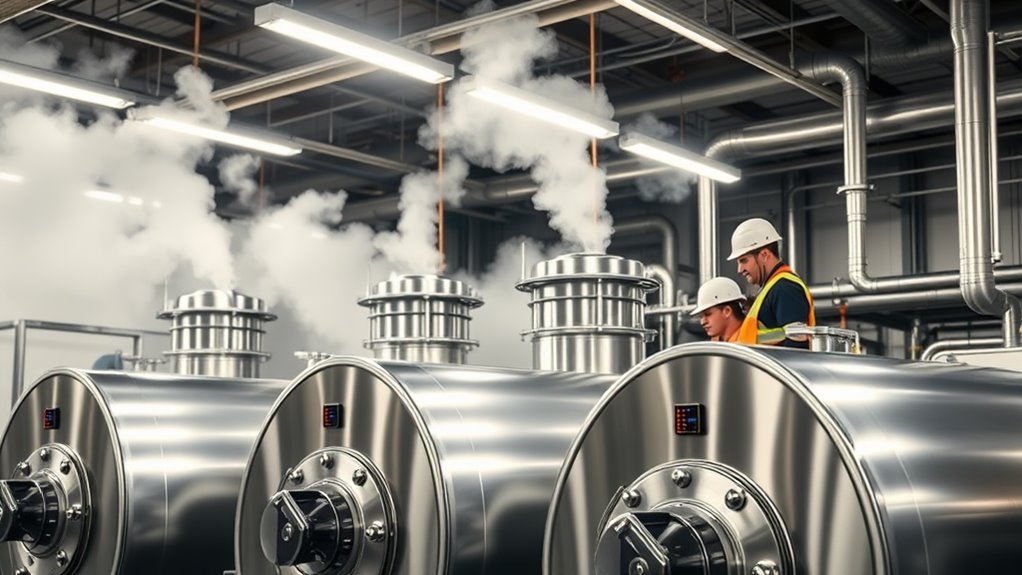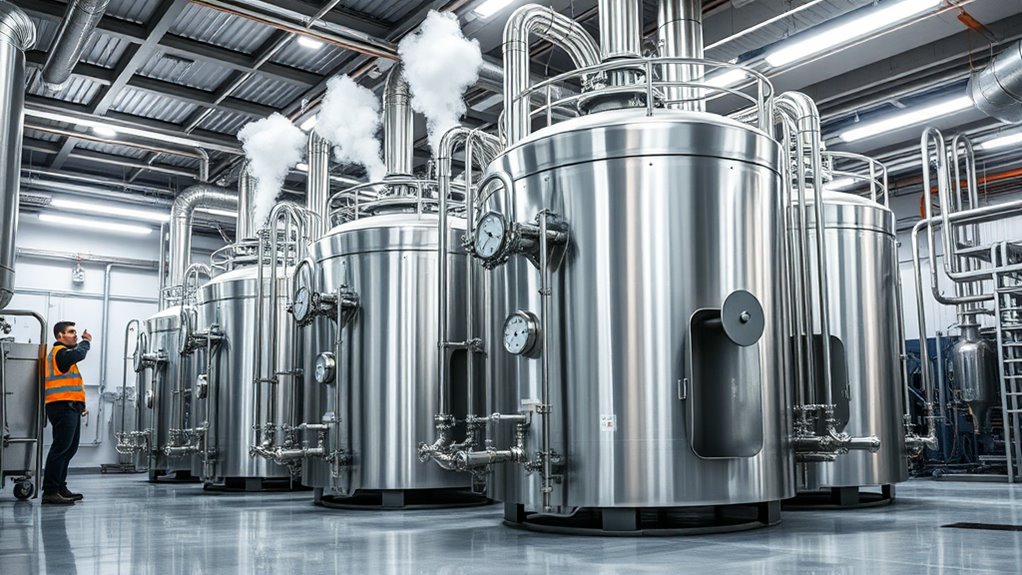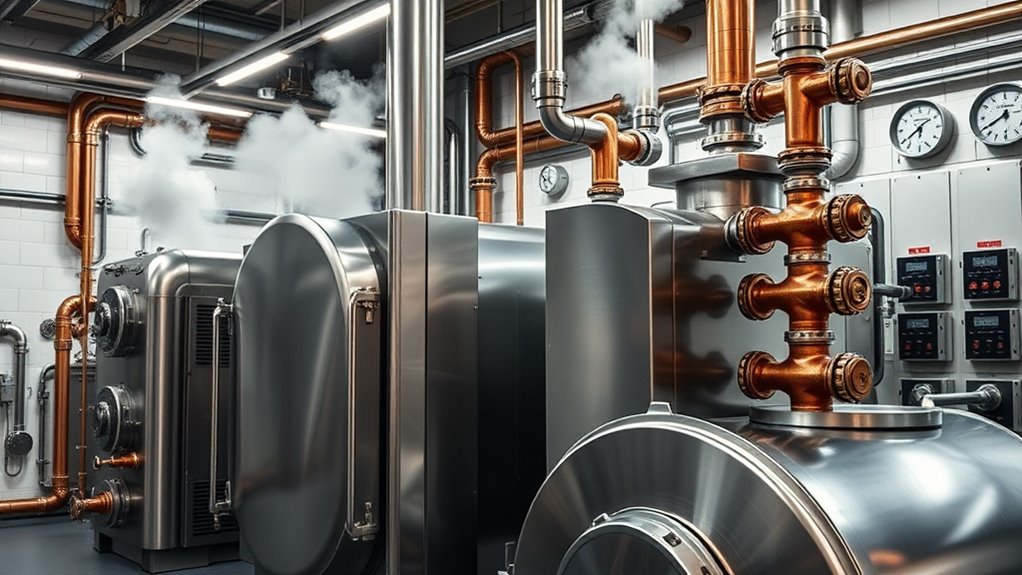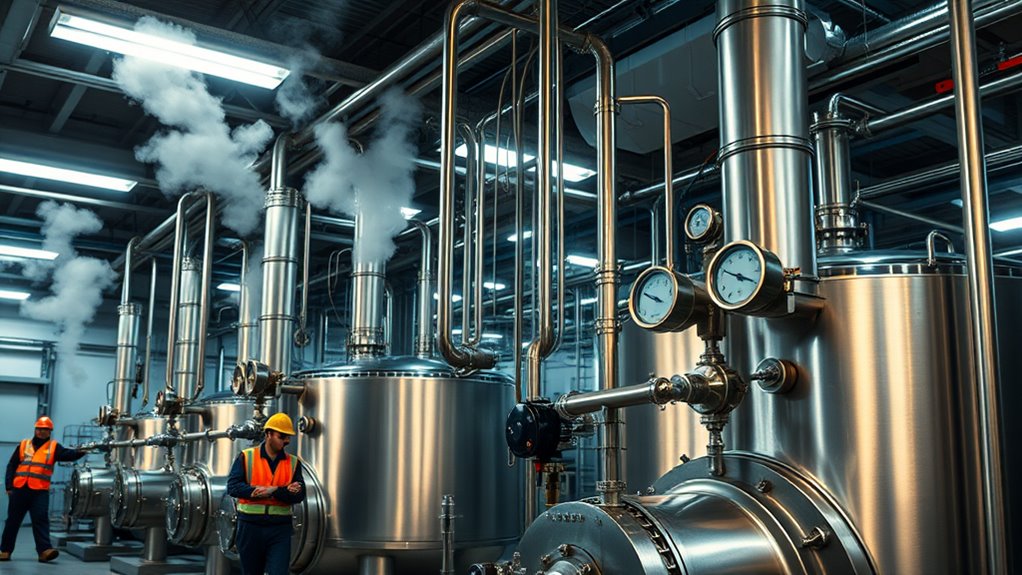Commercial boilers are essential systems for providing efficient heating and hot water in various businesses. They're typically larger than residential models and can handle higher capacities. These boilers operate by burning fuel to generate hot gases, which heat water through a heat exchanger. With options like fire-tube and water-tube designs, they cater to specific commercial needs. Regular maintenance and compliance with safety regulations are critical for peak performance. There's more to explore about their applications and benefits.
Key insights
- Commercial boilers are essential heating systems used in businesses for hot water and heating solutions.
- They are larger than residential boilers and designed for higher capacity operations.
- Common fuel types include natural gas, propane, and oil, ensuring versatility.
- Types include fire-tube, water-tube, and electric boilers, each serving specific commercial needs.
- Regular maintenance and compliance with safety regulations are crucial for efficient and safe operation.
Definition of Commercial Boilers

Commercial boilers are essential components in many businesses, providing key heating and hot water solutions. These systems are designed to meet specific boiler specifications tailored to the demands of commercial heating applications. Unlike residential boilers, commercial units are typically larger and engineered to handle higher capacities, ensuring consistent performance across various environments, such as hospitals, schools, and factories. You'll find that commercial boilers vary in design, efficiency ratings, and fuel types, which can include natural gas, propane, or oil. Understanding these specifications is important for selecting the right boiler for your business needs. By choosing an appropriate commercial boiler, you can optimize energy usage and enhance overall operational efficiency. Additionally, compliance with safety regulations is crucial in ensuring the safe operation of these systems.
How Commercial Boilers Work

Boilers operate by utilizing the principles of thermodynamics to efficiently generate heat and hot water for various commercial applications. In boiler operation, fuel is combusted, producing hot gases that transfer heat to water within a heat exchanger. This process raises the water temperature, creating steam or hot water for heating systems.
The steam or heated water is then circulated through pipes to radiators or other heating elements, effectively warming the space. Proper control systems regulate pressure and temperature, guaranteeing peak performance and energy efficiency. Regular maintenance is essential to prevent malfunctions and prolong the lifespan of the boiler. By understanding how commercial boilers work, you can guarantee your heating systems operate effectively and reliably, meeting your facility's demands. Additionally, regular servicing helps to improve operational efficiency, ensuring that the boiler runs smoothly and reduces energy consumption.
Types of Commercial Boilers

When choosing a commercial boiler, you'll encounter several types, each with distinct features. Fire-tube boilers are known for their efficiency in producing steam, while water-tube boilers excel in high-pressure applications. Electric boilers offer a cleaner alternative, utilizing electricity to generate heat without emissions. Additionally, considering energy-efficient heating options like commercial heat pumps can further enhance the overall energy performance of your commercial property.
Fire-Tube Boilers
Fire-tube boilers represent an essential category of heating equipment in commercial applications, known for their efficiency and reliability. In these systems, hot gases pass through tubes submerged in water, transferring heat effectively. This design maximizes fire tube efficiency, allowing for rapid heat exchange and lower fuel costs. Fire-tube applications are diverse, ranging from small businesses to large industrial facilities. You'll find them ideal for heating systems, hot water supplies, and steam generation. Their straightforward design often leads to easier maintenance and operational simplicity, making them a popular choice among facility managers. By understanding fire-tube boilers' capabilities, you can optimize your heating solutions to meet your commercial needs effectively. Regular maintenance, including commercial power flushing, is crucial to ensure these systems operate efficiently and prolong their lifespan.
Water-Tube Boilers
In contrast to fire-tube boilers, water-tube boilers utilize a different design that enhances their ability to generate steam quickly and efficiently. This design features water contained in tubes surrounded by hot gases, maximizing heat transfer. Here are some key water tube advantages:
- Higher Efficiency: Water-tube boilers can operate at higher pressures and temperatures.
- Quicker Response: They can generate steam faster, ideal for fluctuating demand.
- Compact Size: Their design allows for a smaller footprint compared to fire-tube boilers.
- Enhanced Safety: In the event of a failure, the smaller volume of water reduces the risk of catastrophic explosions.
These benefits make water-tube design a popular choice for various commercial applications. Additionally, regular plant room maintenance is crucial for ensuring the safe and efficient operation of these systems.
Electric Boilers
Although many commercial boilers rely on combustion for heat generation, electric boilers offer a clean and efficient alternative, using electricity to produce steam or hot water. One of the main electric boiler advantages is their ability to minimize emissions and reduce your carbon footprint. They require less maintenance compared to traditional boilers since there are no moving parts or fuel storage needs. Additionally, electric boiler installation is typically simpler, as it doesn't require extensive venting or fuel supply lines. This can save you both time and money during the setup process. Overall, electric boilers are an excellent choice for businesses looking for efficiency and sustainability without compromising on performance. Consider them for your commercial heating needs. Furthermore, their energy efficiency contributes to lower operational costs, making them a smart investment for businesses.
Key Components of Commercial Boilers

Understanding the key components of commercial boilers is fundamental for efficient operation and maintenance. Familiarizing yourself with these boiler components guarantees peak performance and safety. Here are four vital parts you should know:
- Burner: This component mixes fuel and air for combustion, directly affecting efficiency.
- Heat Exchanger: It transfers heat from combustion gases to water, essential for heating.
- Control Systems: These manage operational parameters, ensuring safety features like pressure and temperature regulation.
- Safety Valves: Designed to release excess pressure, they prevent potential hazards during operation. Additionally, regular inspections are crucial for maintaining ongoing compliance and ensuring the safety of boiler systems.
Applications of Commercial Boilers

Commercial boilers play an essential role across various industries by providing reliable heating solutions tailored to specific applications. You'll find these systems in hospitals, schools, and manufacturing facilities, where they're vital for industrial heating processes. They efficiently produce steam or hot water for space heating, sanitation, and production needs. In food processing plants, for instance, boilers guarantee the proper cooking and sterilization of products. Additionally, in commercial laundry services, they provide hot water for cleaning and drying. By utilizing advanced technologies, modern commercial boilers enhance energy efficiency, minimizing fuel consumption and reducing operational costs. Their versatility makes them indispensable tools for maintaining ideal temperatures in various commercial and industrial environments. Furthermore, regular maintenance, including monitoring boiler pressure, ensures optimal performance and safety throughout their operation.
Benefits of Using Commercial Boilers
One significant advantage of using commercial boilers is their ability to deliver consistent and efficient heating, which is essential for maintaining ideal operational conditions. Here are some key benefits you can expect:
- Energy Savings: Modern commercial boilers often feature advanced technology that optimizes fuel consumption, leading to lower energy bills.
- Operational Efficiency: With their robust design, these boilers guarantee reliable performance, minimizing downtime and enhancing productivity.
- Scalability: You can easily scale your heating system to meet the demands of your growing business.
- Sustainability: Many models are designed to reduce emissions, contributing to a greener environment while still providing powerful heating solutions. Regular maintenance of Alpha boilers can further enhance their longevity and efficiency.
Maintenance and Efficiency Considerations
While it's crucial to reap the benefits of a commercial boiler, regular maintenance is essential to guarantee peak efficiency and longevity. You should schedule routine inspections to identify potential issues before they escalate, making sure your boiler operates smoothly. During these inspections, technicians can recommend efficiency upgrades, such as advanced controls or better insulation, which can enhance performance and reduce energy costs. Additionally, maintaining clean burners and checking for proper airflow can greatly impact efficiency. Neglecting these maintenance tasks can lead to reduced efficiency, increased emissions, and costly repairs. By prioritizing maintenance and considering efficiency upgrades, you'll make certain your commercial boiler remains reliable and cost-effective for years to come. Furthermore, regular monitoring of boiler pressure levels can help prevent issues like the E119 error code from occurring.
Regulatory Standards and Compliance
Ensuring your commercial boiler operates efficiently goes hand in hand with adhering to regulatory standards and compliance requirements. Staying updated on regulatory updates is important, as non-compliance can lead to hefty penalties and operational inefficiencies. Here are some common compliance challenges you may face:
- Understanding Local Regulations: Each jurisdiction may have specific codes that affect your boiler's operation.
- Documentation Requirements: Keeping accurate records of maintenance and inspections is essential.
- Emission Standards: Meeting environmental regulations can be complex and may require modifications.
- Safety Protocols: Ensuring compliance with safety measures is essential to protect your staff and facility.
Frequently Asked Questions
How Long Do Commercial Boilers Typically Last?
Commercial boilers typically last between 15 to 30 years, depending on various factors. The boiler lifespan considerably depends on the quality of the unit and regular maintenance. If you keep up with routine inspections and servicing, you can extend its life. Neglecting maintenance can lead to premature failures, reducing efficiency and increasing costs. Investing in proper care guarantees your boiler operates effectively for its intended lifespan, maximizing your investment in the long run.
What Is the Average Cost of a Commercial Boiler?
The average cost of a commercial boiler ranges from $5,000 to $50,000, depending on capacity and type. You should also factor in installation costs, which can vary greatly based on location and complexity. Additionally, don't forget about ongoing maintenance expenses; these can accumulate over time and influence your total investment. Proper budgeting for both initial and recurring costs is essential to guarantee your system operates efficiently without unexpected financial burdens.
Are Commercial Boilers Energy-Efficient?
Yes, commercial boilers can be highly energy-efficient, especially with advancements in boiler technology. Modern units often feature condensing designs that maximize heat recovery, considerably reducing energy consumption. By utilizing high-efficiency burners and variable-speed pumps, these systems optimize performance and minimize waste. Regular maintenance and proper sizing further enhance their efficiency, ensuring you get the best return on your investment while lowering operational costs and environmental impact.
Can Commercial Boilers Be Installed Outdoors?
Yes, commercial boilers can be installed outdoors, but you'll need to guarantee proper weather protection. When considering outdoor installation, choose models designed for external use, as they typically feature enhanced insulation and corrosion-resistant materials. Additionally, you might want to install protective enclosures or canopies to shield the unit from extreme weather conditions and debris. Proper installation and maintenance will help maximize performance and longevity, even in outdoor environments.
What Are Common Signs of Commercial Boiler Issues?
When you're monitoring your commercial boiler, look for common signs of issues like unusual noises, inconsistent heating, or leaks. These symptoms often indicate a need for immediate boiler maintenance. Additionally, you might notice an increase in energy bills, which can signal inefficiencies. Utilizing effective troubleshooting techniques, such as checking pressure levels and inspecting components, can help you identify problems early and guarantee your system operates smoothly and efficiently.
Summary
In conclusion, commercial boilers play an essential role in various industries, providing efficient heating solutions tailored to larger facilities. Understanding their operation, types, and key components helps you make informed decisions when selecting a system. By considering maintenance, efficiency, and compliance with regulatory standards, you can guarantee peak performance and longevity of your boiler. Ultimately, leveraging the benefits of commercial boilers can enhance your facility's productivity and sustainability, making them a critical investment for any business.

